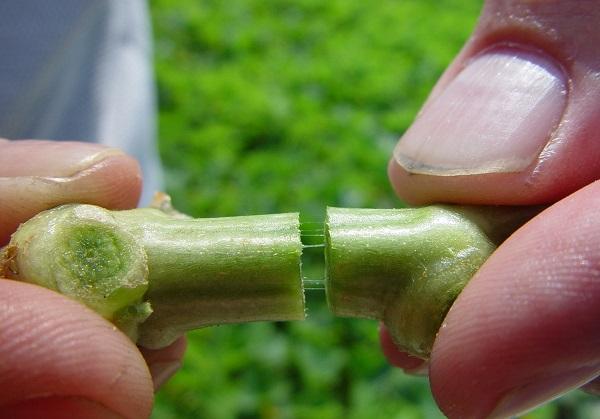Sudden wilting of cucumbers, melons, and summer squash
Cucumbers, melons and occasionally summer squash can suddenly have wilted leaves and stems. A cause can be bacterial wilt, which is a serious disease of cucurbits. It is transmitted principally by striped cucumber beetle feeding. Spotted cucumber beetles, however, are also capable of transmitting the disease. Plants are particularly vulnerable between seedling emergence and the bloom stage. The first symptoms are wilting of individual leaves followed by wilting of individual stems and then of entire plants. Wilted vines may recover at night (regain their turgor) but wilt again the next day. Infected vines die in 7-14 days. Wilted plants should be pulled up and composted.

To test for the disease cut a wilted stem, press the side of a knife to the exposed surface and draw it away. If the plant is infected with bacterial wilt disease you may notice white strands of bacterial ooze. You can also immerse a piece of the wilted stem in room temperature water and look for a milky discoloration of the water caused by the bacteria. The bacteria overwinters in adult cucumber beetles hibernating around the garden.

Photo: Gerald Holmes, Strawberry Center, Cal Poly San Luis Obispo, Bugwood.org
Management
Controlling cucumber beetles early in the season from seedling emergence or transplanting is critical in minimizing the risk of infection. It only takes one cucumber beetle to infect an entire plant. Here are some management techniques:
- Grow 'County Fair', a cucumber cultivar with genetic resistance to bacterial wilt. Select varieties resistant to cucumber beetle feeding (they have lower levels of the attractant compound cucurbitacin)- 'Gemini', 'Little Leaf-19', 'Saladin'.
- Cover seedlings with a floating row cover and only remove it during bloom to allow for insect cross-pollination.
- When the first beetles are observed, spray with a registered insecticide. Neem and pyrethrum are botanical insecticides used by organic gardeners. They are derived from plants.
- Remove weeds and debris from around the garden at the end of the season.
